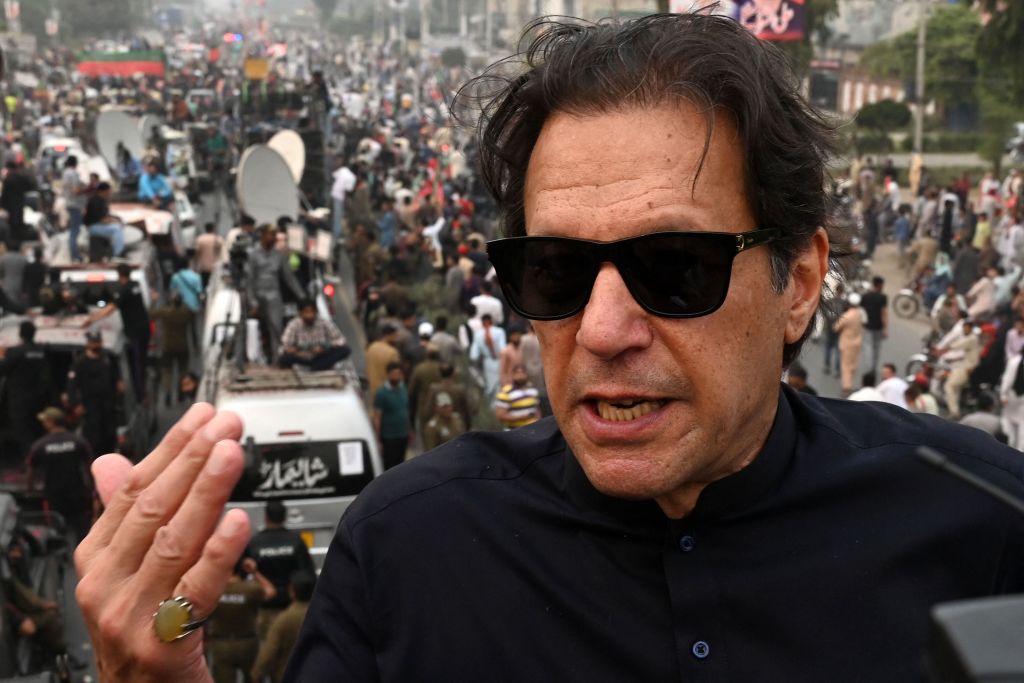At the end of August I warned in The Spectator that, in Pakistan politics, ‘death by assassination is always a risk.’ And so yesterday’s attempted assassination of Imran Khan – while shocking – should have come as no surprise.
Perhaps the bigger surprise was that he survived. As Imran himself stated immediately afterwards, ‘Allah has given me another life.’ It seems that he owes his life to a young man wearing a snazzy FILA sports shirt who wrestled with the assassin as he was firing his pistol – though some reports have it that there was a second assassin firing an automatic rifle.
The circumstances of the aftermath of the assassination attempt bear some scrutiny. Within hours of the shooting, the alleged assassin, Faisal Butt, looking somewhat bedraggled, was shoved in front of a camera by the police – an unusual procedure. One assumes that this was done on the orders of a higher authority. Butt made short work of his confession. ‘I got angry with Khan for spreading hatred and misleading people. I only want to kill Khan and no one else.’ In this last wish he failed; according to officials from Pakistan Tehreek-e-Insaf (Pakistan Movement for Justice party) one supporter was killed and others injured.
Somewhat suspiciously Butt then quickly covered his tracks by saying ‘Nobody was behind me, nobody is with me.’ His declaration of sole agency sounded scripted. Protestations of abhorrence at the assassination attempt by Imran’s replacement as prime minister, Shehbaz Sharif, and a formal condemnation by an equally hostile army, are likely to cut little ice with either Khan or his supporters.
Whatever the truth, given the frequent historic use of assassination as a political expedient in Pakistan, neither Imran nor the PTI are going to accept that this was not a conspiracy. A former cabinet minister in Imran’s government, Shireen Mazari, has already accused the ‘establishment’, a euphemism for the Pakistan army, an institution which, rather like Harry Potter’s nemesis Voldemort, cannot by convention be criticised by name.
After his ouster in a parliamentary coup in April that Khan blamed on ‘international’ players, in other words the United States, the 70-year-old Khan refused to step quietly into political oblivion or wait for next year’s autumn elections. Subsequently, in a series of rallies, the relentless campaigner proved himself to be his country’s most popular politician. The new incumbent government was hardly helped by rampant inflation caused by the Ukraine war and devastating September floods. In recent regional elections Khan’s PTI party has scored convincing victories.
Stung by electoral setbacks and Khan’s criticism of the army and a high court judge, the Pakistan establishment hit back with farcical judicial charges of ‘high treason’. Legal experts dismissed these charges as unconstitutional. They merely indicated a determination by government agencies to stop Khan from returning to politics.
Similarly, two weeks ago, the Election Commission of Pakistan (ECP) banned Imran Khan from holding high office on the spurious and disputed grounds of ‘making a false statement and incorrect declaration’ of his assets. The charges relate to the sale of a Rolex watch that had been given to Khan. The irony of course is that leaders of the two famously corrupt dynastic parties, the Sharifs’ Pakistan Muslim League and the Bhuttos’ Pakistan People’s party, now in cahoots to stop Khan’s political career, have in the past been shown to have vast hidden overseas property assets.
The ECP’s punishment for Khan has been to revoke his membership of the National Assembly of Pakistan and to announce that ‘his seat has become vacant accordingly’. Countrywide protests erupted at this clearly politically influenced decision. In response to his punishment, last week Khan began a two-week mass march from his home city of Lahore to Islamabad to demand immediate parliamentary elections. Followed by huge crowds he had reached as far as Wazirabad, some 120 miles from the capital, when the assassination attempt took place.
It has already been announced that the PTI’s march on Islamabad will continue. Khan, sporting a lower leg wound will likely ride atop a lorry to give speeches to his dedicated supporters en route. Will this be enough to overthrow the government or force its hand on the date of the next election? Unlikely. But neither the dynastic parties nor their supporters in the Pakistan army are likely to enjoy an easy ride until slated national elections next year. If Imran survives the PTI, no doubt energised by the attempt on Khan’s life, will likely win a landslide victory. At this point the ECP judgments could be overturned, and Khan returned to the prime ministership.
Time will tell whether Khan, somewhat blasé about his personal security arrangements, will suffer more assassination attempts. It should be noted that former prime minister Benazir Bhutto was killed at the second attempt just weeks after the first in 2007. If assassination fails, a military coup could stop Khan’s return to power. As with assassination, Pakistan has a long history of this playbook.






Comments